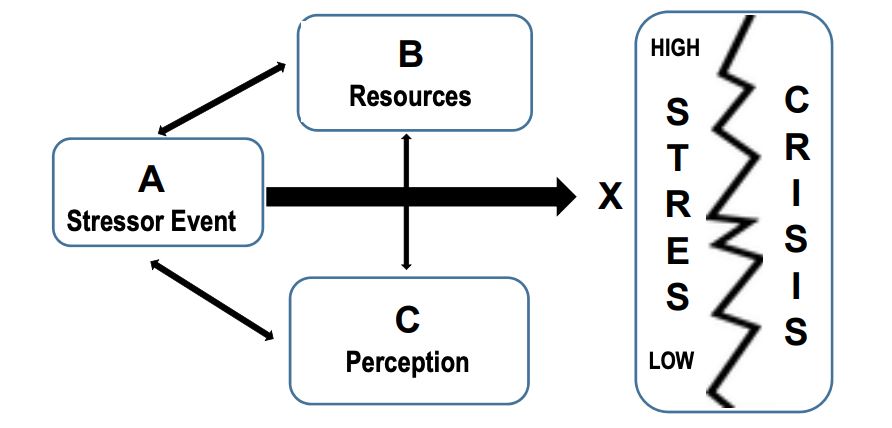Tips for Tackling Stress

From daily hassles to serious tragedies, everyone experiences stress; it is a part of the human experience. High levels of stress over time can take a toll on our bodies. Research shows that chronic stress can affect our sleep, mood, minds, and body, including our digestive and immune systems (Tovian et al, 2017). Just as there are different kinds of stressors, there are also different ways of managing stresses—some are healthier than others. This fact sheet will provide tips and strategies for tackling stress that may be helpful for you and your family.
ABC-X Stress Model
Reuben Hill, a family scientist, developed a model to help families understand and manage stress. While Hill was doing research, he observed how people who suffer similar challenges react to stress very differently. He decided the event itself may not be the only factor related to stress, but rather the resources and meaning of the stressor also played a role. Hill called his model the ABC-X model (Hill, 1949).
Each letter in the ABC-X model represents a different aspect of stress that interact to determine the level of X, or the resulting crisis (see the Figure 1 below).

- A - represents the stressor event.
- B - represents the resources available to the family. These resources may include extended family members, church groups, friends, counselor, etc.
- C- represents the family’s perceptions of the stressor. The seriousness or perception of the stressor depends on several factors: Has the family experienced something like this before? Is it the end of the world? Will things get better? How will they make it through this event?
- X- represents the crisis. Variables B and C determine whether the stressor event (A) results in a crisis. The resources and meaning of events has great impact on how people perceive their stressful situations.
Implementing the ABC-X model in your life can be simple. When a stressful event happens that may impact you and your family, you have the opportunity to take control. Some families struggle when a family member is diagnosed with a serious illness, while other families may still thrive despite the devastating news (Goddard & Marshall, 2010). The difference lies in how people perceive the stressor.
Your Resources
Take a few minutes and write down a few of your family resources. Where do you turn when stressful things happen? Who helps you in your time of need? Knowing these resources beforehand may be helpful during stressful times. How will these resources help you in your next crisis?
When most people think about helpful resources, friends and family often come to mind. However, resources can also include gratitude, optimism, faith, happiness, and other virtues and strengths. Those who are more connected to people and draw on their own strengths and talents tend to be happier and therefore handle stressful situations with more ease (Seligman, 2002). In turn, helping others will also give us a boost of happiness, benefiting our coping skills. Turning outward and serving others is a great way to be a lifeboat for someone else, and increase your own well-being.
Making Sense of Challenges
Understanding why we have hardships can be challenging. The truth is, stressful events can happen to anyone at any given time. Making sense of why you are having these challenges and what they mean to you can help you through a crisis. Think of your last challenge. Did your child misbehave? Lose a loved one? Lose a job? Stuck in traffic? How did you perceive this challenge? What did you learn? Having a positive attitude can help you make sense of your challenges. Here are some tips on how to maintain a positive mindset.
- Develop an attitude of gratitude. Try to remain grateful for all of the things in your life that are going right, and find the potential good in a stressful situation. Some have shared their perspective this way: “We don’t have any problems around here, but we sure do have interesting situations” (Goddard & Marshall, 2010).
- Turn “coal experiences into diamonds” (Goddard & Marshall, 2010). Do you know anyone who has been in a horrible situation and seemed to remain unfazed? One man lost his whole family in a car accident. While this is reason for sorrow, this man did not let his stressful situation have power over him. He learned to cope by finding the positive in his life, and being grateful for what he had. He also was a part of a religious group, which helped him to cope.
- The power of positivity is real. When you put your pessimistic thoughts aside and pay attention to gratitude, you will have an easier time coping with stressful events as they occur.
Growing from Challenges
Challenges are one of the greatest teachers life has to offer. Stress often forces us to grow (Goddard & Marshall, 2010). What have you learned from past hardships? Or present struggles? Think about how these challenges have become a blessing in your life. How have you become a better person because of a tough situation or experience? How has your family become stronger? Three potential blessings of challenges are:drawing closer to people, having greater compassion, and learning how to value the simple things of life (Goddard & Marshall, 2010).
Relaxing Strategies
In the midst of challenges, there are times when we need help relaxing our bodies. A workbook written by professionals entitled, The Relaxation and Stress Reduction Workbook gives great tips on how to help your body relax to overcome stress. Some of these include:
- Breathing – Deep breathing can help calm down your body and help you relax and think more clearly. Sit in a comfortable position with hands in your lap and feet on the floor. Close your eyes and imagine yourself in a relaxing place; anywhere that brings you peace. Slowly take deep breaths in and out; do this for 3-5 minutes at a time.
- Exercise – Engaging in regular exercise can help you release stress by releasing endorphins (feel-good chemicals) and it allows your body systems to practice working together under controlled stress.
- Relax your muscles by stretching, get a massage, or take a hot bath or shower.
- Meditation – Think of a happy place and spend a few moments there.
- Visualization – Close your eyes and think of how you want your life to be. How will you get through this stress? What will happen when this stressful event is over?
Other tips for relaxing and managing stress include:
- Getting adequate sleep, drinking plenty of water, and eating a healthy diet. This helps you feel better in general, gives you energy, and helps contribute to your overall mood.
- Slow down. Life can be extremely busy. Allow plenty of time when you travel, break big tasks into smaller, manageable ones, and take some time each day to just savor and enjoy what you are doing.
- Take a break when you need one—both mental and physical. Breaks could include anything from spending time in nature, going for a walk, prayer, listening to your favorite music, or quiet time away from little ones.
- Make time for hobbies and activities you enjoy. Whether it’s reading, watching a movie, doing a puzzle, or playing a game, even 10-15 minutes doing something distracting and enjoyable can help take your mind off of stress for a bit.
- If things are really stressful, it may be helpful to talk with someone—a family member, friend, trusted clergy leader, or a professional may be helpful.
In addition to the tips in this factsheet, you may find it helpful to browse research-based websites such as https://greatergood.berkeley.edu or www.authentichappiness.com to learn more about managing stress by improving personal well-being and happiness. Then, share what you have learned with your family and loved ones. When you make an effort to use these and other tools, you are on your way to tackling stress head on!
References
- Davis, M., Eshelman, E.R., & McKay, M. (2008). Relaxation and stress reduction workbook (6th ed.). Oakland, CA: New Harbinger Publications, Inc.
- Goddard, H. W., & Marshall, J. P. (2010). Managing stress: Turning challenges into blessings. University of Arkansas Cooperative Extension Printing Service. www.arfamilies.org.
- Hill, R. (1949). Families under stress. New York: Harper & Row.
- Seligman, Martin. (2002). Authentic happiness. Free Press.
- Toviean, S., Thorn, B., Coons, H., Labott, S., Burg, M., Surwit, R., & Burns, D. (no date). Stress effects on the body. American Psychological Association. Retrieved from http://www.apa.org/helpcenter/stressbody.aspx.
Authors
Kailee Hansen; David Schramm
Related Research










